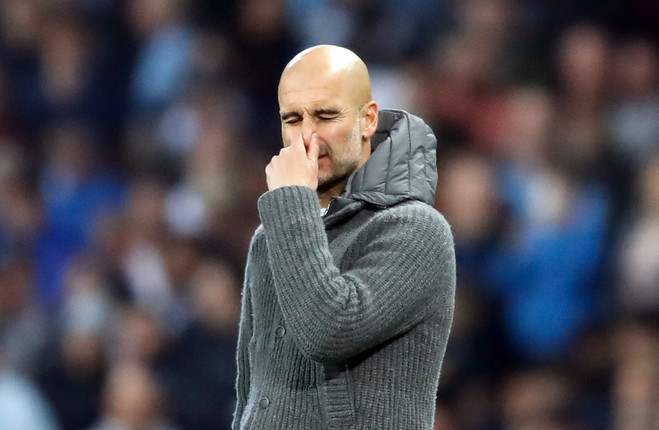PEP GUARDIOLA IS in most people’s eyes one of the greatest coaches football has ever seen.
He is one of a select group of people whose influence has changed the way football is played. His Barcelona team and the style they implemented had a seismic effect on world football.
Although Guardiola’s approach in itself was heavily influenced by Johan Cruyff and others, it contained subtle additions and was carried out in an era when football was faster and players fitter than ever.
While many coaches enjoy great success, few have the kind of visionary qualities that alter people’s very perception of the game.
Guardiola’s impact on the Premier League has been similarly impressive compared with his time in La Liga. Before he arrived in Manchester, the idea of a goalkeeper needing to be almost as comfortable on the ball as a central midfielder would have been dismissed by the majority of British critics. Now, a number of England’s top sides adhere to this philosophy.
Yet while there are many imitators, the Catalan coach’s qualities still separate him from the field, and he has already broken several Premier League records during his Man City tenure, with the obvious help of sizeable funds to attract world-class players and build a formidable squad.
For all Guardiola’s qualities, however, he is not infallible. The one disappointment from his otherwise successful reign at Bayern Munich was his inability to win the Champions League with the club. Especially if repeated hints that he does not intend to stay in football for the long haul prove prophetic, there is an increasing danger of history repeating itself at City.
Come the end of this season, it will be eight years since Guardiola lifted the Champions League trophy for the second time in his managerial career with Barcelona. That achievement was carried out with what most critics perceive as being one of the best clubs sides ever — a Barcelona team with the world-class stars such as Lionel Messi, Andres Iniesta and Xavi either at or close to their prime, while employing the innovative tiki-taka brand of football.
Since then, Guardiola has exited the Champions League semi-finals on four occasions — once with Barca and three times with Bayern. In addition, with City, he has been dumped out of the competition once in the round of 16 and now twice in the quarter-finals.
These facts, of course, do not make Guardiola a bad coach — the Champions League is essentially a cup competition where the best overall team does not always prevail and a degree of luck is required.
Yet in recent times, and particularly during his Bayern tenure, some of Guardiola’s tactical decisions have been heavily criticised. This recurring issue was perhaps most notable in 2014, when the Catalan coach blamed himself after watching the German side suffer a demoralising 4-0 home loss to Real Madrid at the Champions League semi-final stage.
Last night was an altogether different story in many respects. City and Guardiola narrowly exited the competition amid a “cruel” defeat, as their coach put it. Had VAR not come to Spurs’ rescue, Raheem Sterling’s last-gasp goal would have stood, and aside from three minutes of madness in the early stages, City actually played quite well, largely dominating a remarkable encounter with 66% possession and 20 shots (compared to Spurs’ 11).
City and Guardiola deserve considerable credit for the fantastic football they played, even if it led to them being very open at times and making some silly mistakes at the back in the process.
The Etihad outfit’s brave and ambitious approach almost resulted in a memorable victory, but when they reflect on the tie, it is perhaps not last night that Guardiola will look back on with the biggest sense of regret.
Instead, it is the first leg that the Catalan coach will surely rue and in particular, the decision to leave Kevin De Bruyne out of the starting XI, only introducing him in the dying moments of the match.
3 - Kevin De Bruyne is the first player to deliver at least 3 assists in a CL quarter final since Ryan Giggs with Manchester United v Roma in 2007 (4). Prince 👑. pic.twitter.com/m8DaQZVQqA
— OptaJean (@OptaJean) April 17, 2019
The controversial call was a calculated risk and somewhat understandable on account of a number of factors — De Bruyne has had his injury problems this season, his form has been patchy at times and given City’s hectic schedule, even star players need rest on occasion.
Yet opting to consign last season’s PFA Player of the Year nominee to the bench and give him no real time to rescue a difficult situation remains a strange decision.
Notwithstanding his troubles of late, De Bruyne is arguably still City’s best player. And last night further highlighted how bizarre it was to leave out the Belgian international in the initial game.
The 27-year-old tore Tottenham to shreds at times, dictating play and producing a hat-trick of assists. It is hard to imagine City failing to score in the previous fixture with him in the side for 90 minutes, or even half an hour.
Of course, despite Wednesday night’s unfortunate outcome, Guardiola is still a masterful coach and City are unquestionably a great side. The heartbreaking result merely proves that, like the rest of us, they are human. With those rare teams such as City who are bidding for what amounts to sporting immortality, these fine margins are invariably the ultimate difference between success and failure.
Gavan Casey and Murray Kinsella are joined by Bernard Jackman to discuss Izzy Folau’s impending sacking by Australia and all the week’s news on the latest episode of The42 Rugby Weekly:
The42 Rugby Weekly / SoundCloud
Subscribe to our new podcast, The42 Rugby Weekly, here:

